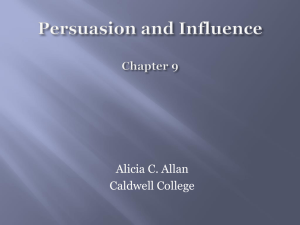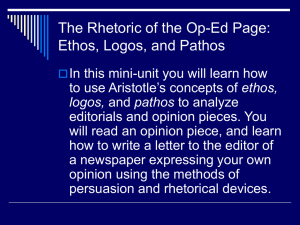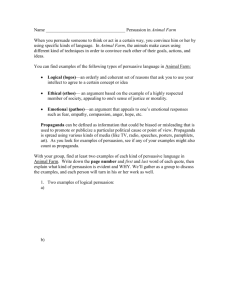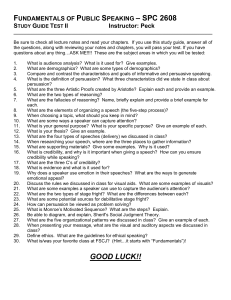Handout - What is Persuasion
advertisement
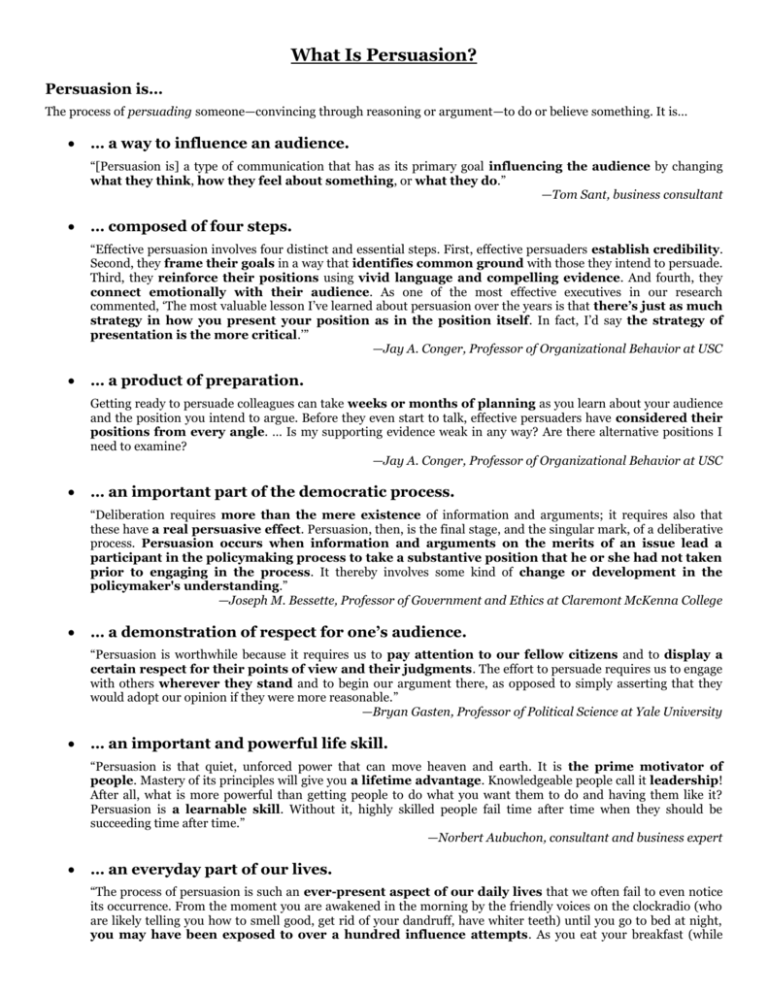
What Is Persuasion? Persuasion is… The process of persuading someone—convincing through reasoning or argument—to do or believe something. It is… … a way to influence an audience. “[Persuasion is] a type of communication that has as its primary goal influencing the audience by changing what they think, how they feel about something, or what they do.” —Tom Sant, business consultant … composed of four steps. “Effective persuasion involves four distinct and essential steps. First, effective persuaders establish credibility. Second, they frame their goals in a way that identifies common ground with those they intend to persuade. Third, they reinforce their positions using vivid language and compelling evidence. And fourth, they connect emotionally with their audience. As one of the most effective executives in our research commented, ‘The most valuable lesson I’ve learned about persuasion over the years is that there’s just as much strategy in how you present your position as in the position itself. In fact, I’d say the strategy of presentation is the more critical.’” —Jay A. Conger, Professor of Organizational Behavior at USC … a product of preparation. Getting ready to persuade colleagues can take weeks or months of planning as you learn about your audience and the position you intend to argue. Before they even start to talk, effective persuaders have considered their positions from every angle. … Is my supporting evidence weak in any way? Are there alternative positions I need to examine? —Jay A. Conger, Professor of Organizational Behavior at USC … an important part of the democratic process. “Deliberation requires more than the mere existence of information and arguments; it requires also that these have a real persuasive effect. Persuasion, then, is the final stage, and the singular mark, of a deliberative process. Persuasion occurs when information and arguments on the merits of an issue lead a participant in the policymaking process to take a substantive position that he or she had not taken prior to engaging in the process. It thereby involves some kind of change or development in the policymaker's understanding.” —Joseph M. Bessette, Professor of Government and Ethics at Claremont McKenna College … a demonstration of respect for one’s audience. “Persuasion is worthwhile because it requires us to pay attention to our fellow citizens and to display a certain respect for their points of view and their judgments. The effort to persuade requires us to engage with others wherever they stand and to begin our argument there, as opposed to simply asserting that they would adopt our opinion if they were more reasonable.” —Bryan Gasten, Professor of Political Science at Yale University … an important and powerful life skill. “Persuasion is that quiet, unforced power that can move heaven and earth. It is the prime motivator of people. Mastery of its principles will give you a lifetime advantage. Knowledgeable people call it leadership! After all, what is more powerful than getting people to do what you want them to do and having them like it? Persuasion is a learnable skill. Without it, highly skilled people fail time after time when they should be succeeding time after time.” —Norbert Aubuchon, consultant and business expert … an everyday part of our lives. “The process of persuasion is such an ever-present aspect of our daily lives that we often fail to even notice its occurrence. From the moment you are awakened in the morning by the friendly voices on the clockradio (who are likely telling you how to smell good, get rid of your dandruff, have whiter teeth) until you go to bed at night, you may have been exposed to over a hundred influence attempts. As you eat your breakfast (while reading the back of the cereal box or glancing at a newspaper ad for a presidential candidate), walk or ride the bus to school or work (and see various billboards along the way), go shopping (where the sales clerk tells you how wonderful the sweater looks that you are trying on), talk to a friend (who tells you how good a new record album is), or go to a movie (where there will be previews of future movies), somebody is attempting to get you to change your mind about something. Even Sunday is not a day of rest from persuasion: on this day, thousands of ministers deliver persuasive messages in an attempt to inculcate certain values.” —Richard E. Petty and John T. Cacioppo, Professors of Psychology at Ohio State University The Role of Persuasion in Debate Debate, by its nature, is a persuasive activity: it challenges students to persuade a neutral judge that their arguments are superior to the arguments of their opponents. Everything we do in debate—from the initial research and argument construction to the in-round debating—aims to effectively persuade our audience. In order to achieve this goal, students work to develop sound arguments supported by quality evidence and to communicate those arguments clearly to the judge in a way that will convince him or her to believe them. The Three Methods of Persuasion Aristotle divided the means of persuasion into three categories: logos, ethos, and pathos. 1. Logos — the appeal to logic. Logos is the use of argumentation (or logic) to convince one’s audience. This category includes arguments, data, statistics, and all types of reasoning. This is the most common method of persuasion used in debate. While it is important, logos by itself is often insufficient to sway an audience because it lacks credibility and emotion. 2. Ethos — the appeal to authority. Ethos is the credibility and character (or ethics) conveyed to one’s audience. It has to do with who you are and how you come across. Aristotle argued that “We believe good men more fully and more readily than others.” In debate, this means that professional, well-prepared, and well-spoken debaters with good reputations are more believable than their peers. 3. Pathos — the appeal to emotion. Pathos is the use of emotion (or passion) to convince one’s audience. It includes appeals to both negative (pity, anger, fear, etc.) and positive (hope, love, humility, etc.) emotions—the goal is to stir up the passions of the audience in order to bolster one’s arguments. Debaters use pathos less frequently than speakers in other settings, but passionate delivery is an important part of effective debating. Effective debaters build strong, logical arguments and communicate them with passion and a sense of credibility. Discussion Questions 1. Sant defines persuasion as a type of communication with the primary goal of influencing an audience to change "what they think, how they feel about something, or what they do." What is an example of a situation recently in which you used persuasion? Who were you trying to influence? What were you trying to influence them to change? 2. Conger emphasizes the importance of preparation in achieving maximum persuasiveness. Suppose that you are working with a non-profit organization and are tasked with convincing a charitable donor to make a financial contribution to your group. What preparation would be involved before meeting with this donor? How could you prepare to maximize the persuasiveness of your presentation?
